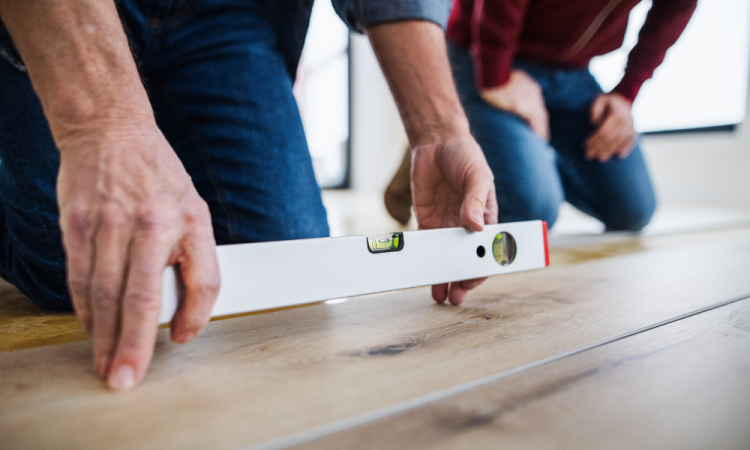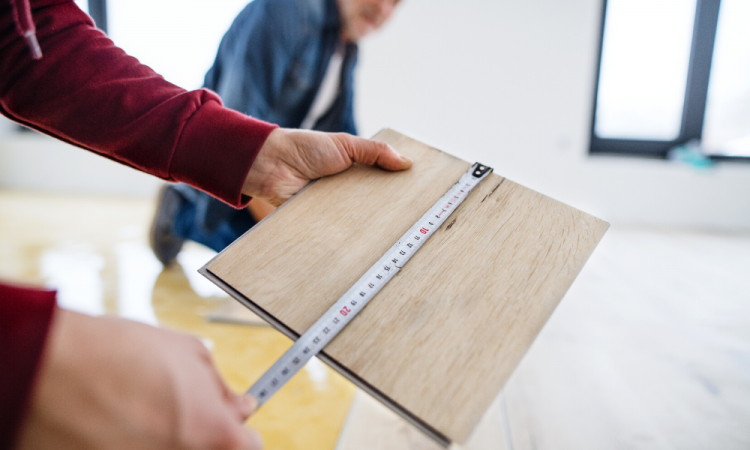Pros and Cons of Resilient Vinyl Flooring
- Published By: District Floor Depot

Are you thinking about installing resilient vinyl in your home?
Vinyl flooring has increasingly become one of the most popular flooring options in people’s homes and, without a doubt, the most favored form of resilient flooring. People especially love it in bathrooms and kitchens where it can be crucial to have protection from water damaging your beautiful floors.
As a matter of fact, vinyl flooring has advanced the most out of any other type of flooring in the last ten years in regards to design and quality. Every year, vinyl manufacturers are changing the game and creating more realistic modern looks.
Why Vinyl Flooring Is Great For Your Home
Vinyl’s versatile flooring material is one of the main reasons people love it in their homes, and it is so sought after. But before you make a big decision for your home, it’s essential to know both the pros and cons of the material you will be paying for.
One of the beautiful things about new flooring is that it can completely alter a room for the better. Vinyl flooring can be a great way to add some flare to your home, with all the different patterns and colors it can really bring forward the upgrade you’ve been looking for to different rooms in your home. But just like everything in life, there are ups and downs to using this material in your home.
Is vinyl the right fit for you? Check our list of pros and cons for vinyl flooring.

5 Pros of Vinyl Flooring
Understanding the benefits of a particular flooring material can help make the selection process much easier. Here are 5 things that make vinyl flooring a great option for your flooring endeavor.
- Pricing. Vinyl is very inexpensive to have installed in your home. Prices can be as low as 50 cents per square foot. Prices for higher-end vinyl can lean towards the eight to ten dollar range. But this still ends up being cheaper for you than other flooring options. Rates for this flooring will differ based on the level of quality you want to spend your money on.
- Water Proof. This is the ideal flooring material to use in a room with high moisture, such as a bathroom or kitchen. The last thing you want to deal with after spending time and money to have new floors put in is unnecessary water damage. A quality vinyl floor installed correctly guarantees protection from water damage on your precious floors.
- Low Maintenance. Vinyl floor is extremely easy to maintain and keep clean in your home. So if you find you are quite busy and don’t have a ton of time to spend cleaning, this flooring material may be perfect for you. The only equipment you need to keep your floors sparkling is a broom, mop, and a decent floor cleaner. It doesn’t get much easier than that! As far as scratches and marks go, there are simple precautions you can take with your furniture to prevent these.
- Stain Proof. Stains can be a big problem with certain materials. However, vinyl is not one of them. Vinyl tiles and sheets have a transparent protective layer covering the surface. This not only protects the look of the floor but also acts as a shield against spills and stains.
- Comfort. Vinyl flooring is delightful and comfortable to walk on. The padded layer beneath the sheets provides just the right balance of firmness and give under your feet. The material is softer than most flooring options, and in the winter, it does not get ice cold beneath your feet.
5 Cons of Vinyl Flooring
No flooring material is without drawbacks. Below are 5 cons that are typically associated with vinyl flooring.
- Consistent Look and size. Most of the popular vinyl products today are hardwood flooring looks. Unlike natural wood, one section from another or plank to plank will look identical coming out of the boxes. Manufacturers typically use 5-20 images printed under the protective vinyl veneer. When installing planks particularly, you will end up with the same image coming out of boxes. Recommend to work out of 2-3 boxes at a time during the install and pay attention to placement otherwise you may have a section of the floor look exactly the same. Vinyl planks are typically 48” to 60” long while solid or engineered wood would be random lengths.
- Not Biodegradable. Unfortunately, vinyl flooring is not eco-friendly; it is unable to naturally break down, resulting in added waste to the environment. This material is rarely recycled due to its harmful, toxic chemical makeup, so sadly, it ends up in landfills and causes more pollution.
- Floor Damage. One of the downsides to vinyl flooring is you need a specific floor surface, to begin with for a problem-free installment. Vinyl can only be installed on a relatively smooth, clean surface. So if you have an old bumpy floor to start with, this installment would not work for you. In this case, you may end up paying extra by having to prep the old surface prior to your new vinyl flooring.
- Prone to tearing. Unfortunately, Sheet vinyl can possibly rip and tear over time. When this occurs, there is sadly no way to fix one part of it. The entire floor has to be replaced, and the removal process is not an easy one. Vinyl floors are challenging to remove, primarily if an adhesive is used during installation. The durability of vinyl ranges by the quality. So if you want your vinyl floors to last a really long time, you will have to pay more for high-quality material. On the other hand, glue down luxury vinyl planks (LVP) or floating options (WPC or SPC) are easy to repair or replace.
- Color Change. Over long period of time in years vinyl can often begin to develop slightly yellow discoloration. This mainly has to do with old age, but over time sunlight, trapped dirt, and debris will alter the color and pattern you once loved. So if this is a material you are considering, definitely go with higher quality vinyl.

Do the benefits of vinyl flooring outweigh the drawbacks? Based on your budget and personal preferences, that’s up to you to decide.
Have District Floor Depot Install Your Resilient Vinyl Floor
Now that you know the pros and cons of vinyl flooring, you might have some thinking to do and decisions to make. Whether or not vinyl flooring will suit you and your home is a big choice, but knowing all the facts, you are sure to make the right one!
Need help choosing what type of floor is right for your home? The floor experts at District Floor Depot can help walk you through the selection process. Visit one of our Washington D.C. showrooms to browse our vast collection of materials.
